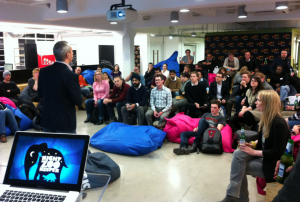The London Educational Games Meetup group (or LEGup, as it’s become known), was started just over two years ago by Kirsten Campbell Howes, an educational specialist and game designer. At first, it was a small gathering in a room above a pub, where a few like-minded games makers and enthusiasts would show what they were working on, ask for feedback, and share their experiences. Two years later, LEGup has nearly 800 members (including games developers, teachers, investors and others), has outgrown the pub and acquired another organizer (me). Clearly, there is something interesting going on in educational games: an explosion of interest and activity.

Kirsten and I realized that part of the reason for LEGup’s success was that it was pretty much the only organization running meetups on this subject and that learning games makers were in general poorly served for resources and information. Furthermore, since many were working in small teams, or on their own, they were keen to learn from others and get advice on areas that they knew less about, often about marketing or the business aspects. To help meet this need, we launched a new website in June for educational games-makers, edugameshub.com.
It feels like we’re in the middle of an exciting time for the scene in the UK. We’ve had some great success stories amongst members. Nightzookeeper, a creativity game and set of apps, won a highly competitive place at the Wayra start up accelerator last year. Zondle, a site that allows teachers to create their own learning games, has gone from 120,000 to 450,000 registered users in the last year. Our members also include Cowly Owl, Frosby Apps, Interface3, Preloaded, Thoughtden and many more who’ve produced some really beautiful, engaging and popular learning games for all ages. And investors are starting to take notice, another start-up accelerator looking specifically at educational technology has just launched, the Emerge Venture Lab and they have expressed a keen interest in getting game based learning projects involved.
However, it’s not all smooth sailing. Educational game developers here face a number of critical challenges, and many are finding it tough to create sustainable businesses. The main issues are:
-
As mentioned above, many games developers are only in small outfits or working totally solo, and may find they don’t have all the skills necessary without the money to hire in more expertise.
-
Creating good educational games can be hard! Getting the balance between learning and fun right is a mix of real skill and a bit of luck.
-
Getting games into schools is really difficult. Teachers don’t have huge budgets, and don’t have much time. Many are also yet to be convinced about the value of games based learning.
-
So it makes sense to target parents, but the sheer number of educational apps and games that are now out there make it hard to rise above the competition. The most obvious route is via the App Store, but you are basically at the mercy of Apple’s editorial decisions about which app to feature or not.
-
There is still only a small pool of funding and investment available. The Technology Strategy Board recently ran an open competition for games but this sort of funding is few and far between.
-
Outside of LEGup and edugameshub there are few opportunities for knowledge sharing between games developers, and especially between academics working in this field and practitioners. Kirsten and I wrote this blog post recently for NESTA that goes into more detail about this issue.
Mindful of both the potential and the challenges, NESTA (formerly the National Endowment for Science, Technology and the Arts) has recently launched a digital education blog series and kicked it off with an event on “Game-Science and Game-Based Learning: Bringing Education to Life” that I was invited to join the panel for.
It was a fascinating event and discussion. Given the amount of interest in this area, it wasn’t surprising to see that the room was packed, and the questions were all thought-provoking. Why aren’t we learning from previous research and projects on games based learning? How can we provide better evidence for the efficacy of using educational games? What about non-digital games in the classroom? How can we convince the government to provide support to this industry?
We may not have agreed on what the answers were to all those questions, but it was great to see the conversation moving on and getting stuck into some of the real issues. I hope that edugameshub can work with Nesta and also games industry bodies such as UKIE to find solutions to some of these challenges and help support all these brilliant games makers. It’s certainly an interesting time to be working in this area, so watch this space!
 Martha Henson is a freelance digital producer and co-Director of edugameshub.com, a newly-launched online resource and global community of educational games makers. Edugameshub is the sister website to #LEGup, the London Educational Games Meetup Group, which now has over 700 members, all interested in creating, using, teaching with, or even investing in learning games of all sorts.
Martha Henson is a freelance digital producer and co-Director of edugameshub.com, a newly-launched online resource and global community of educational games makers. Edugameshub is the sister website to #LEGup, the London Educational Games Meetup Group, which now has over 700 members, all interested in creating, using, teaching with, or even investing in learning games of all sorts.

